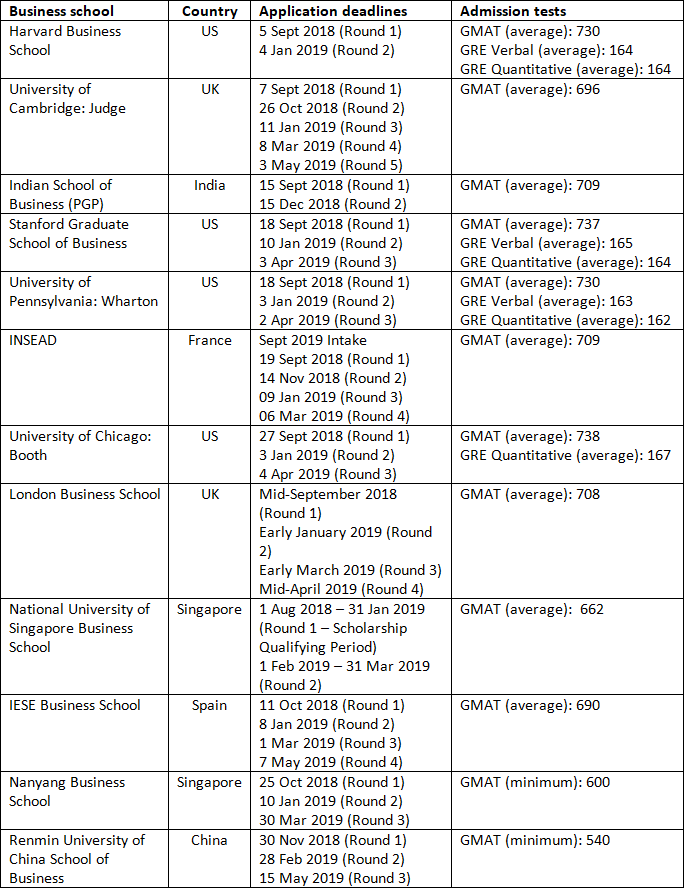
Usually, the first step that accompanies a decision to enroll in MBA study is to research the field. Are you looking for general management training or will you benefit from a particular specialization? What geographic area is most convenient for your studies? What requirements do you need to fulfill for admission to a particular program? These are just some of the questions to consider when browsing information about schools online or when consulting peers and colleagues.
First things first: admission tests
When planning to enroll in a business and management degree such as an MBA, or a Master’s in Management or Finance, you may be required to submit a standardized test score. As Linda Abraham, founder of admissions consulting firm Accepted, tells Poets&Quants:
B-schools weigh your standardized test scores (GMAT or GRE) as one piece of the puzzle, along with your GPA, to gauge whether you’re academically prepared for their programs.
Most business schools accept both GMAT and GRE but since management studies can be very competitive, you should be aware of the average scores achieved by current MBA students. A careful look at the table provided at the end of this article will give you an idea of the admission test performance in the MBA programs of some of the most reputable institutions around the world.
Admissions directors often emphasize that their process of reviewing applications is holistic. Although the GMAT score is rarely the only decisive factor for MBA admission, a commonly recommended preparation strategy is to first focus on taking the test. Then, once you have obtained your score, you can use it as a point of reference to filter out the programs that fit your score range from those that seem to be unattainable. If you approve of this strategy, preparing early and organizing your time efficiently will be even more important to succeed.
Check out: Choosing the Most Effective GMAT/GRE Preparation
What about other admissions criteria?
Next to GMAT and GRE scores, business schools may require an English proficiency certificate such as TOEFL or IELTS, a letter of recommendation, official transcripts, and one or more application essays. Some of these requirements are subject to change from year to year and depend on the policy of a particular school. For example, some MBA programs request that their application essays address specific, pre-determined topics which differ every year or are randomly assigned. The format of the essay is also school-specific and, recently, the preference for video essays has gained popularity in some institutions.
While application essays and recommendations are highly personalized components of the application, GMAT and GRE are referred to as “standardized tests” for a reason. Scores obtained on both exams are valid for five years after the date you took the test, while IETLTS and TOEFL scores are valid for two years, which means you will have ample room to be flexible. Taking care of this element from your to-do list early on enables MBA aspirants to dedicate just as much effort to the rest of their application package.
Check out: Common Mistakes to Avoid in Your MBA Application
Don’t be afraid to retake the test
If you rushed through your GMAT or GRE preparation and you are not happy with your score, you can always try again. It is important to remember that standardized tests do not reflect your existing business knowledge. They are designed to assess your cognitive and analytical skills – skills which can be improved and practiced. By using proper practice materials and finding your optimal preparation strategy, getting a higher score that makes a difference is within your grasp. Once again, retaking the GMAT or the GRE should not disrupt your application schedule as long as you secure an early start to your preparation.
In any case, your test-taking strategy should be realistic and in line with your abilities. As suggested by The Economist, sitting the exam a second or third time is not a decision to be taken lightly:
Retaking the GMAT is not usually negatively perceived by business schools. However, […] taking the exam eight times and not improving can be perceived negatively, while taking the exam fewer times and improving your score sends a strong, positive message.
Finally, not all MBA programs are created equal. Be sure to look through the details provided by each business school on your application shortlist and always double-check the official information provided on their websites. Each MBA experience is unique and you should find one that will bring you closer to accomplishing your dreams and goals.
Check out: What’s Next after the MBA Admissions Decision?
2019 Intake: Application Deadlines and Aptitude Tests for Some of the Top Full-Time MBA Programs (listed by earliest application date)



Comments